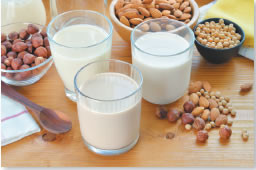
Zinc: What it does for the body, and the best food sources

Respiratory health harms often follow flooding: Taking these steps can help

Tips to leverage neuroplasticity to maintain cognitive fitness as you age

Can white noise really help you sleep better?

Celiac disease: Exploring four myths

What is prostatitis and how is it treated?

What is Cushing syndrome?

Exercises to relieve joint pain

Think your child has ADHD? What your pediatrician can do

Foam roller: Could you benefit from this massage tool?
Diet & Weight Loss Archive
Articles
Does a low-salt diet really improve your health?
Using salt substitutes containing potassium chloride instead of using sodium chloride (table salt) may help reduce heart attack and stroke risk. A Harvard study published online Nov. 13, 2021, by The New England Journal of Medicine found that people who consumed the most sodium chloride had a 60% higher risk of a major cardiovascular event (a heart attack, a stroke, cardiac stent placement, or surgery) compared with those who consumed the least. People who consumed the most potassium chloride had a 31% lower risk of a major cardiovascular event compared with the people who consumed the least.
Smart snack strategies
Between-meal snacks can either help or hinder people's efforts to eat a heart-healthy diet. Simple strategies such as upgrading food choices can help. Instead of low-quality carbs like candy or potato chips, people should choose high-quality carbs like fruit or whole-grain crackers, along with a little protein or healthy fat (such as half an apple with a handful of nuts). They should also try to avoid eating simply out of habit when they're not actually hungry.
Meal of the month: Southern side dishes
Traditional Southern cuisine features side dishes based on vegetables, beans, and whole grains that, when served together, can make a complete, meat-free meal that’s both filling and tasty.
Overeating? Mindfulness exercises may help
It's possible to overeat and not even realize it until you've finished a meal and doing so does not mean you have an eating problem or disorder. Mindfulness exercises can help you slow down and enjoy eating, making it easier to avoid overeating.
Adding potassium and subtracting sodium may equal better heart health
Consuming less sodium and more potassium may be linked to better heart health, according to a November 2021 study published in the New England Journal of Medicine. After controlling for other risk factors, the researchers found that for every extra 1,000 milligrams (mg) of sodium detected in the urine, there was an 18% increase in the risk of cardiovascular disease. For every extra 1,000 mg of potassium in the urine, there was an 18% decrease in risk.
Could a low-carb diet help your heart?
A 2021 study found that a low-carb diet may not necessarily be bad for heart health, despite its high saturated fat content. However, the study period was short, and the diet used in the trial was healthier than many low-carb approaches. More research is needed to confirm the results. In the meantime, experts recommend finding a sustainable diet that provides a healthy daily mix of nutritious foods instead of solely looking at carbohydrate content.
Saturated fat eaten in the short term might not threaten heart health
People who follow a low-carbohydrate/high-fat diet for weight loss often eat high amounts of saturated fat. Even though saturated fat can contribute to cardiovascular disease, a 2021 study suggests that eating higher amounts might not be bad for heart health in the short term.
Should I keep exercising if I can't lose weight?
Exercising is crucial for good health, even if exercising doesn't help a person get down to a healthy weight. Exercising reduces the risk of high blood pressure, high cholesterol, high blood sugar levels, heart disease, stroke, diabetes, Alzheimer's disease, and premature death. If someone is overweight and unfit, the risk of premature death is double the risk of someone who is the same age and sex, and is overweight but fit.
Why is eating healthy so hard?
Many people still struggle with healthy eating, even though they know the basic guidelines to follow. This often is due to misperceptions that following a healthy diet is too difficult and too expensive. Making small changes in one's diet can help many people change their attitude about healthier eating and make it easier to embrace.
In search of a milk alternative
People who are unable to or don't want to drink cow's milk have alternatives, such as milks made from grains, nuts, and soy.

Zinc: What it does for the body, and the best food sources

Respiratory health harms often follow flooding: Taking these steps can help

Tips to leverage neuroplasticity to maintain cognitive fitness as you age

Can white noise really help you sleep better?

Celiac disease: Exploring four myths

What is prostatitis and how is it treated?

What is Cushing syndrome?

Exercises to relieve joint pain

Think your child has ADHD? What your pediatrician can do

Foam roller: Could you benefit from this massage tool?
Free Healthbeat Signup
Get the latest in health news delivered to your inbox!
Sign Up











